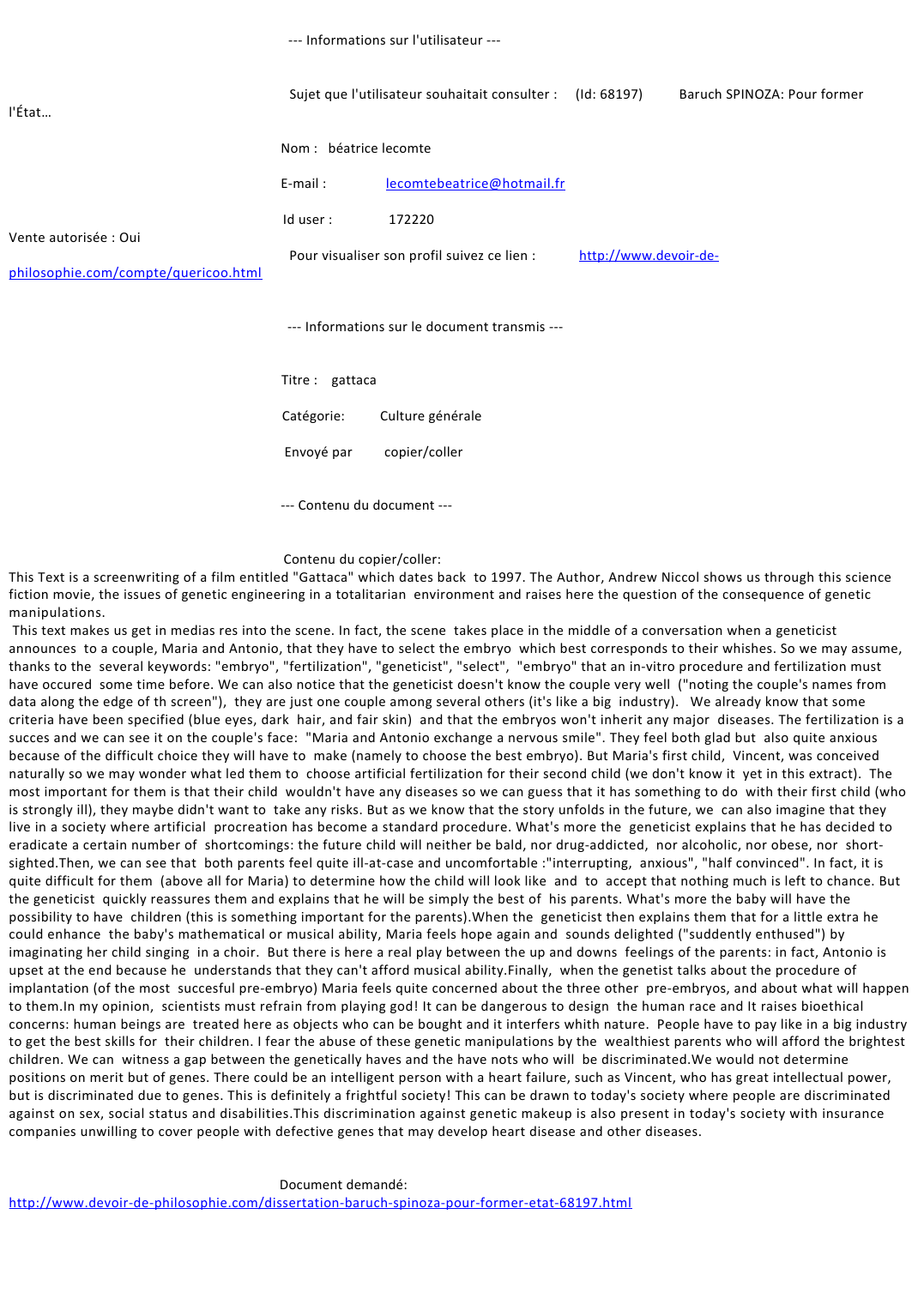Gattaca
Publié le 16/05/2020

Extrait du document
«
--- Informations sur l'utilisateur --- Sujet que l'utilisateur souhaitait consulter : (Id: 68197) Baruch SPINOZA: Pour formerl'État… Nom : béatrice lecomte E-mail : [email protected] Id user : 172220Vente autorisée : Oui Pour visualiser son profil suivez ce lien : http://www.devoir-de- philosophie.com/compte/quericoo.html --- Informations sur le document transmis --- Titre : gattaca Catégorie: Culture générale Envoyé par copier/coller --- Contenu du document --- Contenu du copier/coller:This Text is a screenwriting of a film entitled "Gattaca" which dates back to 1997.
The Author, Andrew Niccol shows us through this science fiction movie, the issues of genetic engineering in a totalitarian environment and raises here the question of the consequence of genetic manipulations.
This text makes us get in medias res into the scene.
In fact, the scene takes place in the middle of a conversation when a geneticistannounces to a couple, Maria and Antonio, that they have to select the embryo which best corresponds to their whishes.
So we may assume,thanks to the several keywords: "embryo", "fertilization", "geneticist", "select", "embryo" that an in-vitro procedure and fertilization musthave occured some time before.
We can also notice that the geneticist doesn't know the couple very well ("noting the couple's names fromdata along the edge of th screen"), they are just one couple among several others (it's like a big industry).
We already know that somecriteria have been specified (blue eyes, dark hair, and fair skin) and that the embryos won't inherit any major diseases.
The fertilization is asucces and we can see it on the couple's face: "Maria and Antonio exchange a nervous smile".
They feel both glad but also quite anxiousbecause of the difficult choice they will have to make (namely to choose the best embryo).
But Maria's first child, Vincent, was conceivednaturally so we may wonder what led them to choose artificial fertilization for their second child (we don't know it yet in this extract).
Themost important for them is that their child wouldn't have any diseases so we can guess that it has something to do with their first child (whois strongly ill), they maybe didn't want to take any risks.
But as we know that the story unfolds in the future, we can also imagine that theylive in a society where artificial procreation has become a standard procedure.
What's more the geneticist explains that he has decided toeradicate a certain number of shortcomings: the future child will neither be bald, nor drug-addicted, nor alcoholic, nor obese, nor short-sighted.Then, we can see that both parents feel quite ill-at-case and uncomfortable :"interrupting, anxious", "half convinced".
In fact, it isquite difficult for them (above all for Maria) to determine how the child will look like and to accept that nothing much is left to chance.
Butthe geneticist quickly reassures them and explains that he will be simply the best of his parents.
What's more the baby will have thepossibility to have children (this is something important for the parents).When the geneticist then explains them that for a little extra hecould enhance the baby's mathematical or musical ability, Maria feels hope again and sounds delighted ("suddently enthused") byimaginating her child singing in a choir.
But there is here a real play between the up and downs feelings of the parents: in fact, Antonio isupset at the end because he understands that they can't afford musical ability.Finally, when the genetist talks about the procedure ofimplantation (of the most succesful pre-embryo) Maria feels quite concerned about the three other pre-embryos, and about what will happento them.In my opinion, scientists must refrain from playing god! It can be dangerous to design the human race and It raises bioethicalconcerns: human beings are treated here as objects who can be bought and it interfers whith nature.
People have to pay like in a big industryto get the best skills for their children.
I fear the abuse of these genetic manipulations by the wealthiest parents who will afford the brightestchildren.
We can witness a gap between the genetically haves and the have nots who will be discriminated.We would not determinepositions on merit but of genes.
There could be an intelligent person with a heart failure, such as Vincent, who has great intellectual power,but is discriminated due to genes.
This is definitely a frightful society! This can be drawn to today's society where people are discriminatedagainst on sex, social status and disabilities.This discrimination against genetic makeup is also present in today's society with insurancecompanies unwilling to cover people with defective genes that may develop heart disease and other diseases.
Document demandé:http://www.devoir-de-philosophie.com/dissertation-baruch-spinoza-pour-former-etat-68197.html.
»
↓↓↓ APERÇU DU DOCUMENT ↓↓↓


